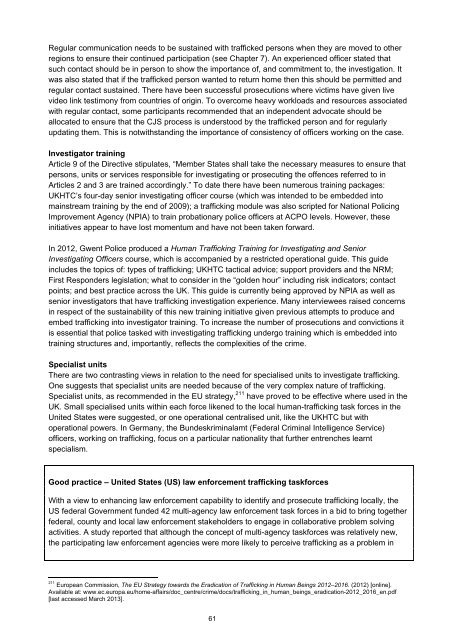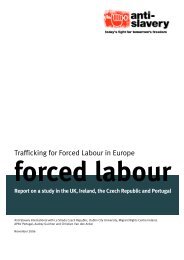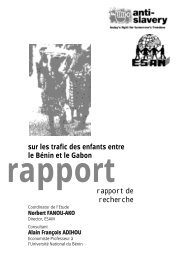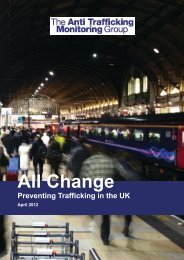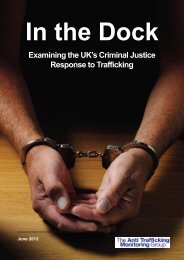CPS 209 must not decide whe<strong>the</strong>r a victim or witness can receive <strong>the</strong>rapy. It stresses that <strong>the</strong> decisionshould be taken by <strong>the</strong> person concerned and <strong>the</strong>ir doctors or professional counsellors.Fur<strong>the</strong>rmore, accessing specialised support, for example for substance related addictions, is moredifficult as most service providers are not equipped to manage <strong>the</strong>se issues. This is problematic astraffickers are known to target persons with addiction/dependency or introduce substances to gaincontrol. One service provider stated:“I have a case where <strong>the</strong> victim does want to give a statement but when he gets stressed he drinks, and hegets stressed about <strong>the</strong> police interview so I can’t, at <strong>the</strong> moment, get him sober enough to do an ABEinterview”.Many NHS services available for addiction/dependency have no experience or knowledge of how torespond to trafficked persons. A fur<strong>the</strong>r complication in access to counselling is a requirement thatexisting addictions/dependencies are managed before a client can be registered. However, a shortageof facilities and long waiting lists make it impossible for trafficked persons to access such services atcrucial times. It was also reported that victims with learning difficulties, who are also known to betargeted by traffickers, have problems accessing tailored services even where <strong>the</strong> impact of traffickingis understood.<strong>In</strong> response to many of <strong>the</strong> women supported by TARA exemplifying trauma symptomatology, and toovercome long waiting lists for specialist psychological support and/or community based mental health(which are not tailored to <strong>the</strong> particular needs of trafficked persons), TARA has a secondedConsultant Clinical Psychologist and an Assistant Psychologist who are provided by NHS GreaterGlasgow and Clyde COMPAS Trauma Service. These posts are funded by <strong>the</strong> Scottish Governmentto uphold its obligations to psychological support under <strong>the</strong> Convention and Directive. This hasenabled TARA to promote a trauma-informed service and this expertise is used to advise <strong>the</strong> policeand UKBA of significant mental health concerns.Service providers were also concerned about <strong>the</strong> way in which <strong>the</strong> police explain to trafficked persons<strong>the</strong> ramifications of participating in an investigation. Some participants said that trafficked personswere not fully informed about <strong>the</strong> consequences of making a statement and often <strong>the</strong> processesaround <strong>the</strong> CJS were not explained. Yet an informed witness has <strong>the</strong> potential to be a better witness.While <strong>the</strong> police have an obligation to advise trafficked persons clearly on such processes, serviceproviders may find <strong>the</strong> DVD Next Steps produced by <strong>the</strong> charity Living Lens helpful. The DVDexplains <strong>the</strong> CJS in England and Wales and <strong>the</strong> roles of <strong>the</strong> various actors to <strong>the</strong> women trafficked forsexual exploitation, including disclosing to <strong>the</strong> police, safety, preparing for court, special measures incourt, and sentencing of traffickers and case studies of victims’ court system experiences. <strong>In</strong> a similarvein, <strong>the</strong> CPS released <strong>the</strong> CPS Public Policy Statement on Prosecuting Cases of HumanTrafficking 210 to allay fears that trafficked persons may have in relation to how <strong>the</strong>ir case may behandled; however, <strong>the</strong> existence of such a statement was said by research participants to have hadlittle impact in persuading trafficked persons to participate in criminal proceedings.Where victims were moved to ano<strong>the</strong>r location under <strong>the</strong> NRM dispersal process, <strong>the</strong> police did notalways sustain communication on <strong>the</strong> case’s development. A law enforcement officer explained:“… we’d instigated getting <strong>the</strong> victim to a place of safety. That was quite a distance away from our policingarea and as a result it caused communication and staffing issues … That actually caused quite a fewdelays and, again, <strong>the</strong>re was no urgency in [getting a statement]. If it was something like a rape … we haveset deadlines where we have to go in to get <strong>the</strong> first account and secure evidence”.209CPS, Provision of <strong>the</strong>rapy for vulnerable or intimidated adult witnesses prior to a criminal trial - Practice guidance [online] undated.Available at: www.cps.gov.uk/publications/prosecution/pretrialadult.html [last accessed March 2013].210CPS, CPS Policy for Prosecuting Cases of Human Trafficking (May 2011) [online]. Available atwww.cps.gov.uk/publications/docs/policy_for_prosecuting_cases_of_human_trafficking.pdf [last accessed March 2013].60
Regular communication needs to be sustained with trafficked persons when <strong>the</strong>y are moved to o<strong>the</strong>rregions to ensure <strong>the</strong>ir continued participation (see Chapter 7). An experienced officer stated thatsuch contact should be in person to show <strong>the</strong> importance of, and commitment to, <strong>the</strong> investigation. Itwas also stated that if <strong>the</strong> trafficked person wanted to return home <strong>the</strong>n this should be permitted andregular contact sustained. There have been successful prosecutions where victims have given livevideo link testimony from countries of origin. To overcome heavy workloads and resources associatedwith regular contact, some participants recommended that an independent advocate should beallocated to ensure that <strong>the</strong> CJS process is understood by <strong>the</strong> trafficked person and for regularlyupdating <strong>the</strong>m. This is notwithstanding <strong>the</strong> importance of consistency of officers working on <strong>the</strong> case.<strong>In</strong>vestigator trainingArticle 9 of <strong>the</strong> Directive stipulates, “Member States shall take <strong>the</strong> necessary measures to ensure thatpersons, units or services responsible for investigating or prosecuting <strong>the</strong> offences referred to inArticles 2 and 3 are trained accordingly.” To date <strong>the</strong>re have been numerous training packages:UKHTC’s four-day senior investigating officer course (which was intended to be embedded intomainstream training by <strong>the</strong> end of 2009); a trafficking module was also scripted for National PolicingImprovement Agency (NPIA) to train probationary police officers at ACPO levels. However, <strong>the</strong>seinitiatives appear to have lost momentum and have not been taken forward.<strong>In</strong> 2012, Gwent Police produced a Human Trafficking Training for <strong>In</strong>vestigating and Senior<strong>In</strong>vestigating Officers course, which is accompanied by a restricted operational guide. This guideincludes <strong>the</strong> topics of: types of trafficking; UKHTC tactical advice; support providers and <strong>the</strong> NRM;First Responders legislation; what to consider in <strong>the</strong> “golden hour” including risk indicators; contactpoints; and best practice across <strong>the</strong> UK. This guide is currently being approved by NPIA as well assenior investigators that have trafficking investigation experience. Many interviewees raised concernsin respect of <strong>the</strong> sustainability of this new training initiative given previous attempts to produce andembed trafficking into investigator training. To increase <strong>the</strong> number of prosecutions and convictions itis essential that police tasked with investigating trafficking undergo training which is embedded intotraining structures and, importantly, reflects <strong>the</strong> complexities of <strong>the</strong> crime.Specialist unitsThere are two contrasting views in relation to <strong>the</strong> need for specialised units to investigate trafficking.One suggests that specialist units are needed because of <strong>the</strong> very complex nature of trafficking.Specialist units, as recommended in <strong>the</strong> EU strategy, 211 have proved to be effective where used in <strong>the</strong>UK. Small specialised units within each force likened to <strong>the</strong> local human-trafficking task forces in <strong>the</strong>United States were suggested, or one operational centralised unit, like <strong>the</strong> UKHTC but withoperational powers. <strong>In</strong> Germany, <strong>the</strong> Bundeskriminalamt (Federal Criminal <strong>In</strong>telligence Service)officers, working on trafficking, focus on a particular nationality that fur<strong>the</strong>r entrenches learntspecialism.Good practice – United States (US) law enforcement trafficking taskforcesWith a view to enhancing law enforcement capability to identify and prosecute trafficking locally, <strong>the</strong>US federal Government funded 42 multi-agency law enforcement task forces in a bid to bring toge<strong>the</strong>rfederal, county and local law enforcement stakeholders to engage in collaborative problem solvingactivities. A study reported that although <strong>the</strong> concept of multi-agency taskforces was relatively new,<strong>the</strong> participating law enforcement agencies were more likely to perceive trafficking as a problem in211European Commission, The EU Strategy towards <strong>the</strong> Eradication of Trafficking in Human Beings 2012–2016. (2012) [online].Available at: www.ec.europa.eu/home-affairs/doc_centre/crime/docs/trafficking_in_human_beings_eradication-2012_2016_en.pdf[last accessed March 2013].61
- Page 1 and 2:
In the DockExamining the UK’s Cri
- Page 3 and 4:
AcknowledgementsThis report was mad
- Page 5 and 6:
PrefaceIn May 2009, a group of nine
- Page 7 and 8:
Misconceptions around exploitation
- Page 9 and 10:
Acronyms and abbreviations frequent
- Page 11 and 12: Executive SummaryIn the Dock is The
- Page 13 and 14: Furthermore, the current legislatio
- Page 15 and 16: The ATMG was made aware of some cas
- Page 17 and 18: • Introduce mandatory child-speci
- Page 19 and 20: • The UK’s ability to meet the
- Page 21 and 22: Traffickers’ primary motivation i
- Page 23 and 24: • Money launderers - turn profits
- Page 25 and 26: out to perpetuate the exploitative
- Page 27 and 28: [their] own enslavement” is as fu
- Page 29 and 30: Chapter 2: UK Anti-Trafficking Legi
- Page 31 and 32: nationals who commit trafficking of
- Page 33 and 34: Like the SOA, the “act” element
- Page 35 and 36: (b) D requires another person to pe
- Page 37 and 38: Forced or compulsory labourThe defi
- Page 39 and 40: ConclusionAs a consequence of the s
- Page 41 and 42: concerningly, the number of convict
- Page 43 and 44: women who were recruited in Poland
- Page 45 and 46: Chapter 4: Identifying trafficking
- Page 47 and 48: Misconceptions around exploitationT
- Page 49 and 50: espond inadequately to a trafficked
- Page 51 and 52: multi-agency teams was described by
- Page 53 and 54: Josie Connors. 179 In summary, inte
- Page 55 and 56: defending a trafficked person for f
- Page 57 and 58: “[B]ecause the NRM decision is on
- Page 59 and 60: PTSD. 196 A Consultant Psychiatrist
- Page 61: etween the client and the police, i
- Page 65 and 66: Priority planningA particular issue
- Page 67 and 68: Chapter 6: Multi-agency and interna
- Page 69 and 70: canvassing for tarmacking opportuni
- Page 71 and 72: Despite this, it would appear that
- Page 73 and 74: Good practice - Operation Golf 229O
- Page 75 and 76: Chapter 7: Criminal proceedingsThe
- Page 77 and 78: Law enforcement working on the case
- Page 79 and 80: trafficking require particular unde
- Page 81 and 82: JuryPractitioners suggested that th
- Page 83 and 84: years”. 258 Ambiguity within the
- Page 85 and 86: officer stated that not all judges
- Page 87 and 88: jurors to be assisted with expert e
- Page 89 and 90: Good feedback was received from sem
- Page 91 and 92: The Convention does recognise that
- Page 93 and 94: Another option for trafficked victi
- Page 95 and 96: There are two models with respect t
- Page 97 and 98: 1. Is there clear evidence that the
- Page 99 and 100: decision can be taken into account
- Page 101 and 102: also entails being “alert to the
- Page 103 and 104: In some cases concerns were even ra
- Page 105 and 106: Chapter 9: Prosecuting child traffi
- Page 107 and 108: However, many children are not refe
- Page 109 and 110: trafficking”. 352 It states: “W
- Page 111 and 112: Previous research has found that th
- Page 113 and 114:
children as well as assisting in pr
- Page 115 and 116:
Child trafficking trainingThere is
- Page 117 and 118:
were too traumatic to involve them
- Page 119 and 120:
committed by a child whilst in a co
- Page 121 and 122:
• Introduce mandatory child-speci
- Page 123 and 124:
IdentificationThe PSNI is the main
- Page 125 and 126:
participants suggest that this is b
- Page 127 and 128:
The PPS stated that the reasons for
- Page 129 and 130:
this research was aware of potentia
- Page 131 and 132:
convictions of traffickers prosecut
- Page 133 and 134:
Possibly in response to certain hur
- Page 135 and 136:
espectively. In addition to custodi
- Page 137 and 138:
Conclusion and RecommendationsThe A
- Page 139 and 140:
CRIMINAL PROCEEDINGS• Ensure that
- Page 141 and 142:
Crown Prosecution Service, Legal Gu
- Page 143 and 144:
Herman. J. Trauma and Recovery: The
- Page 145 and 146:
Annex I: Trafficking and other form
- Page 147 and 148:
(a) on summary conviction, to impri
- Page 149 and 150:
(b) which country is the country of
- Page 151 and 152:
2009 Istvan Kalocsai (Snr)MetS.57 o
- Page 153 and 154:
2009 causing actual bodily harm, su
- Page 155 and 156:
Skirmantas Kvedaras Feed, 2010 Rape
- Page 157 and 158:
2012 Ahdel Ali (24)Mubarek Ali (29)
- Page 159 and 160:
Annex III: The CPS’s Seven Stages
- Page 161 and 162:
159


